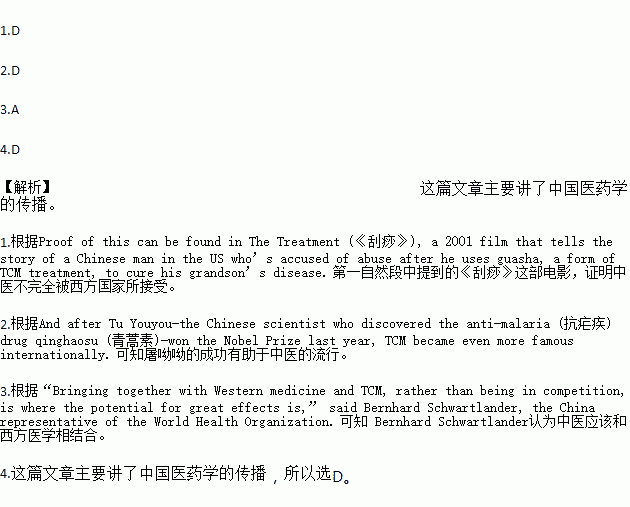题目内容
It has been around for centuries, but up until very recently, traditional Chinese medicine (TCM) wasn’t fully accepted abroad. Proof of this can be found in The Treatment (《刮痧》), a 2001 film that tells the story of a Chinese man in the US who’s accused of abuse after he uses guasha, a form of TCM treatment, to cure his grandson’s disease.
During the last 10 years or so, however, TCM has been getting increasingly popular all over the world. A report released by the State Council Information Office on Dec. 6 says this style of health care, which includes different forms like herbal medicine and exercise, has spread to 183 countries and regions.
“We have set up 10 TCM centers outside China, and all of them are popular among locals,” Wang Guoqiang, head of the State Administration of Traditional Chinese Medicine, said at a news conference on Dec 6. “Governments of 86 countries and regions have signed agreements with the Chinese government on TCM corporation.”
One of the reasons behind the growing popularity of TCM is the increase of scientific research into it. And after Tu Youyou-the Chinese scientist who discovered the anti-malaria (抗疟疾) drug qinghaosu (青蒿素)-won the Nobel Prize last year, TCM became even more famous internationally.
However, all these achievements in TCM don’t mean that it’s problem-free. Over the years, TCM has faced challenges in being able to prove that it has certain effects.
Some researchers have suggested TCM should be more exact and work together with Western medicine.
“Bringing together with Western medicine and TCM, rather than being in competition, is where the potential for great effects is,” said Bernhard Schwartlander, the China representative of the World Health Organization.
1.The film The Treatment is mentioned in the first paragraph is to .
A. introduce the film to readers
B. show TCM is increasingly popular
C. arouse readers’ interest in Western medicine
D. prove that TCM is not fully accepted in western countries
2.We can learn from the passage that .
A. TCM is not exact in curing diseases
B. 10 TCM centers abroad are all set up by locals
C. 86 countries have cooperated with China on TCM
D. Tu Youyou’s success contributes to the popularity of TCM
3.According to Bernhard Schwartlander, TCM should .
A. combine western medicine
B. face no challenge at all
C. give an exact description of its effects
D. complete with western medicine
4.Which of the following can be the best title of the passage?
A. A report on TCM B. Opinions about TCM
C. TCM & Western Medicine D. Traditional healing spreads


 B. took turns C. turned out D. looked up
B. took turns C. turned out D. looked up